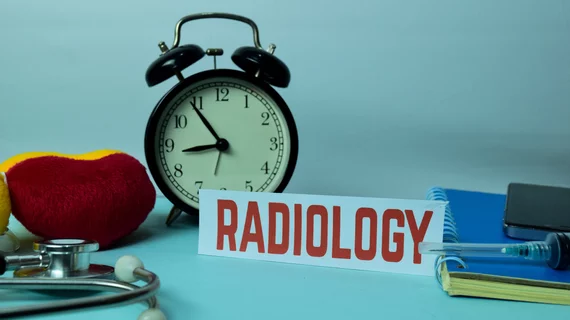Radiology researchers explore why patients miss imaging appointments, with 2 key factors emerging
Radiology researchers are seeking to better understand why patients miss scheduled imaging appointments, with two key factors emerging from their results.
Investigators at the University of California, Irvine, conducted their analysis using data from four imaging centers affiliated with a tertiary care center in the state’s southern region. Across nearly 300 patients who missed appointments, 44% said they were grappling with financial hardship, researchers detailed Tuesday in Clinical Imaging [1]. Another 33%, meanwhile, were facing at least one health-related social need.
Despite these high rates, fewer than 13% said they had previously been vetted for such imaging impediments.
“Our results suggest the importance of implementing screening for both [health-related social needs] and financial hardship at every patient encounter for all patients,” UCI radiologist and corresponding author Gelareh Sadigh, MD, and colleagues wrote July 9. “Additionally, institutions should implement strategies to effectively refer and intervene on high-risk patients identified through screening. For example, those without reliable transportation to and from their appointment can be given subsidizations for ride-share services or bus vouchers.”
The analysis incorporated adult patients who were fluent in English and failed to show up for an outpatient exam (CT, MRI, PET/CT or mammography) between 2022 and 2023. Patients who missed appointments were an average age of 55 and nearly 71% were female. More than half (52%) were non-Hispanic white, with Asian (23%) and Latino (16%) the next two most common racial/ethnic backgrounds.
Patients initiated almost 75% of missed appointments. Nearly 14% were due to cost or insurance coverage issues, and 6% stemmed from transportation and parking. Sadigh et al. also calculated Comprehensive Scores for Financial Toxicity, which measure patients’ financial distress related to diagnosis and treatment. Average COST score was 26.8 on a 44-point scale, with lower scores indicating higher levels of concern. About 44% of study subjects said their illness was a source of financial hardship, and 29% identified imaging as a root cause. Over 18% said their nonadherence stemmed from care costs and 35% pinpointed “material hardship.” Sadigh and co-authors identified food insecurity as the most common health-related social need, impacting 25% of study participants.
“Patients endorsing food insecurity due to financial instability should be connected to the Supplemental Nutrition Assistance Program (SNAP) program,” the authors suggested. “Further, these interventions should be integrated into clinic workflow to ensure that all patients in need receive assistance. To mitigate financial barriers, the integration of financial navigation services to assist patients with insurance and cost management is essential. Furthermore, expanding coverage and services, especially for uninsured and underinsured populations, is predicted to increase healthcare utilization to levels comparable to adequately insured individuals, potentially improving overall health outcomes.”
Read more in the official journal of the New York Roentgen Society at the link below.

